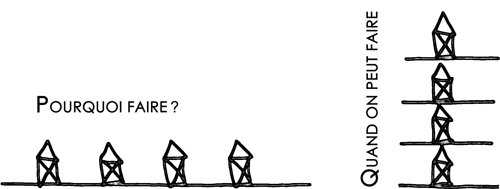Jean Houssemand is defending his PhD thesis : Conceptualization and evaluation of a typology of vertical housing concept for sustainable urban planning
The defense will take place in Dijon at the University of Burgundia at the Maison des Sciences de l'Homme, Salle des Thèses (6 Esplanade Erasme), on february 14th at 14pm.
This work was directed by Jean-Philippe Antoni, Professor at the University of Burgundy, laboratory ThéMA.
Defense jury
Denis Bocquet, Professor at the National School of Architecture of Strasbourg
Éric Charmes, Director of Research at the Laboratory for interdisciplinary research on cities, spaces and society (EVS RIVES), Graduate School of Civil, Environmental and Urban Engineering, Vaulx-en-Velin
Pierre Frankhauser, Emeritus Professor at the University of Franche-Comté
Hélène Haniotou, Professor at the National Technical University of Athens, Greece
Abstract
Context. The current urban development process is the result of a paradoxical situation. On the one end, families prefer individual housing, which finds the favourable conditions to its spreading in the more or less distant from towns outskirts, while wishing to benefit from services (proximity to amenities, public transport offers, etc.) which are rather the corelate of dense urban centralization. On the other hand, in order to fight against environmental, social and economic costs of urban sprawl, and also aim towards a more sustainable city, the urban renovation and compact city projects lead to some density levels that only collective housing enables to reach.
Problematic. So, the equation « control of the urban sprawl, satisfaction of the house request and sustainable city » seems to be unsolvable, especially due to the lack of a housing offer being able to combine the particularities of the detached house and the needs of urban density. Two relatively separate tandems « housing / territory and induced mobility » result from it : individual housing, which is dependent on cars, is mainly situated in peri-urban areas, whereas collective housing, which is not approved by most families, gather in the town centers with many alternatives to cars. In such a context, through the main concept of « vertical housing development », this doctoral research work arises the hypothesis that the enlargement of the prism of the mobilities and urban areas analysis should enable the emergency of new solutions, which will include the housing and territories specifications in a multidisciplinary and multiscale way.
Methodology. In order to confirm this hypothesis, the methodology hinges on two steps. First, a review of the architectural literature allowed to define the « vertical housing concept » as an innovative answer to the equation which is insolvable nowadays : indeed, the history of architecture informs us profusely on the opportunities of a vertical urbanism unexploited until now ; this enables the creation of hanging artificial grounds to build in floors detached houses. In second place, the state of the art allowed to identify the main determinants of housing attractiveness while confronting the two classical tandems (individual/collective) to the concept of « vertical housing development » and suggests a theoretical model adaptable to different cases. Validation. The model has been evaluated three times. Firstly, the information gathered during a photo-elicitation inquiry allow to validate the architectural choices a posteriori and make sure of their suitability in terms of residential preferences (social validation). Secondly, a legal evaluation shows that a development of the current regulatory measures is indeed partially necessary to the operational development of the model, but the latter can nevertheless quickly fulfill the demand while fighting against urban sprawl. Thirdly, a geographical evaluation which compares the deployment of the model with the reality of available grounds and the localization of amenities and transport infrastructure, shows that it would concretely allow to densify the town and its outskirts according to a logic close to the Transit Oriented Development (TOD). Results. Three major results arise from this evaluation. Indeed, the « vertical housing development » concept seems (i) to match with the residential choices from a significant part of the French families, (ii) to be immediately authorized and managed by the current legal and regulatory framework, (iii) to benefit from a consequent potential of development at the level of the Strasbourg-Eurometropolis which serves as an example to this thesis. Moreover, at a time when multidisciplinary and multiscale approaches are questioned, this thesis work, which links an architectural approach at the housing level and a geographical approach at the city level, gives a specific example of new types of housing formalization, based on the original principle of a decoupling between « housing types » and « territories ».
Keywords : Housing types, Housing concept, Urban form, Urban renewal, Compact city, Sustainable city, Evaluation, Modelization, Multidisciplinarity, Multiscalarity

